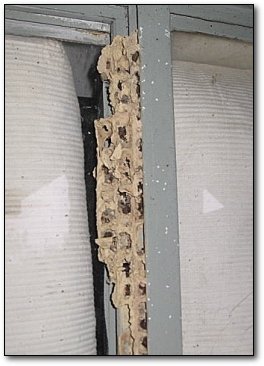The 7 Most Impressive Examples of Animal Architecture

We have a pretty good idea about what sets humanity aside from the animals. We built the Pyramids, assholes.
Well, we hate to break it to you, but animals have been cranking out architectural marvels since humanity was still trying to figure out how pooping works. We're talking about things like ...
The Great Wall of Beavers

Contrary to popular belief, the Great Wall of China cannot be seen from space. But you know what can be seen? The 2,790-foot beaver dam of North Alberta, Canada.

Damn. (We sincerely apologize for that pun.)
First discovered by someone messing around on Google Earth, it's the largest piece of animal-built infrastructure on the planet, and according to some science people, it would have taken upwards of 20 years to build, and can be seen in satellite images from 1990.

Originally constructed to keep out enemies -- like China's Great Wall -- it's now a tourist attraction for humans astonished about how such a huge thing was built by such inferior creatures. The dam acts as a moat and protects the beavers from much of their land-based adversaries such as foxes and bears. In addition, the monstrous constructs also house several generations of beavers.

Nice beaver. (OK, that was the last one -- we swear.)
For reference, normal beaver dams clock in at around half the size of this one, but nonetheless, they can typically rival the Hoover Dam in length, which is pretty good for giant rats whose only method of construction is slapping things with their tails.
Mile-High Termite Megacities

Termites are probably more renowned for tearing down infrastructure than building their own, but the bastards that actually take up residence in your house are really just the lazy ones. In the wild, termites live in elaborate mounds built out of soil, mud, chewed wood and clumps of their own poop. Though the word "mound" doesn't quite do them justice, as each one is a 30-foot-tall self-sustaining megacity that can be seen on satellite images. When we said they are a "mile high" we of course mean that on termite scale -- as in, that's how massive these structures would be if humans were to build one.

In terms of scale, that would be six times bigger than your average Midwest town.
Underground, the termite colony can sprawl for several acres, and provides a self-sustaining city with everything the bugs need for survival. They even have little termite motel rooms just for mating.

And it's totally flipping us off. What a dick.
The termites even farm their own resources. Colonies are equipped with underground farms where fungus is cultivated with collected plant matter. It's seriously like Hobbiton down there.
Most impressive is the fact that all of this is centrally heated. Not only do they build their towers facing north to south to regulate heat, tunnels throughout the mound serve as ducts to regulate the air flow and temperature of the colony, which is crucial to the upkeep of those cute little mushroom farms. To put this in perspective: Back when humans were still all living in huts made from mud and bark, the termites were already chilling out in enormous, air-conditioned arcologies. At this point, the only reason they don't simply take over the world is that we don't have anything they need.

Some day our future overlords will rise
Social Weaver Birds and Their Sky Condominiums

Social weavers are kind of the Hilton family of the bird world. Not only do they build the biggest nests of any bird, but the constructions are permanent -- housing hundreds of birds over several generations. And they actually rent out the extra rooms to birds of other species.

They'll rent by the hour if you talk to Guido.
Their housing projects are as elaborate and decadent as any human condo, considering all of their decor is made of twigs. One pair of birds occupies each chamber, which is further subdivided into several rooms with entrances below the nest. The inner rooms retain heat and are used during the night, while the outside rooms are actually cooler than their surroundings and are used during the day. They'd have a large outdoor spa if they could figure out how to make the bubbles work.
Social weaver nests are so sturdy that they can last for hundreds of years, and the birds can even booby-trap the entrances with sharp sticks if they're vulnerable to snake infiltration. Life in the nest is so snug that other kinds of bird, even carnivorous pygmy falcons, are known to move in under the condition that they don't eat anybody.

They're like the YMCA for birds, and without the shower rape
Gopher Towns

You might think you learned everything you need to know about gophers from Caddyshack, the film classic in which Bill Murray is driven insane by a single gopher digging holes in his golf course. Surprisingly, this is misleading as a nature documentary, and if Murray's character knew what was really going on behind the scenes, he probably would have climbed a clock tower with a sniper rifle years before.

"Is there a problem, asshole? That's what I thought. Walk away."
Gophers' burrows are really called "towns," owing to the fact that they can spread hundreds of acres and contain thousands of rodents at a time. They keep themselves relatively self-sufficient by hoarding an incredible amount of food from the area above, which they smuggle back into town inside their cheeks.

And if that bird doesn't cool its shit, it's going to get itself smuggled.
Their underground tunnels are astonishingly well organized, with rooms for sleeping, for keeping warm in winter and even nurseries for junior gophers. On top of that, they (like the termites) have air chambers to regulate temperature. You might be thinking that an underground city is particularly susceptible to flooding, but the gophers have that covered. They actually build freaking levees around the entrances and laugh at any creature that hasn't developed the technology to withstand natural disasters.

Sophisticated shit
On top of all this, your typical gopher town is as well protected from enemy invasion as Helm's Deep. The gophers have little watchtowers which are formed from the dirt they dug out of their tunnels. Gophers will stand on top of their mounds and silently watch for enemies.
When the gopher on duty (we assume they work in shifts) sees something suspicious, it sends a high-pitched whistle into the burrow and all the gopher archers and gopher berserkers arm the walls and brace the main gates. We only made some of that last part up.

Four seconds after this photo, they called him "Lefty."
Mud Dauber Prisons

If spiders are the villains of the bug world, mud dauber wasps can be described as the Batmen of said world. Like most wasps, they capture spiders for food, but mud daubers go one step further and imprison their nefarious prey in little asylums made of mud and wasp barf.

Pretty much the way they do it at fast food restaurants.
Mud dauber nests are composed of dozens of distinct prison cells, each of which contains up to three spiders. At any one time, there can be as many as two dozen prisoners inside plotting their next brazen escape. However, because wasps are neither idiots nor very good wardens, they paralyze the spiders first, limiting their ability to incite riots or trade each other for cigarettes.
Of course, the criminal justice system works a little differently for bugs. All of the inmates of wasp prison are convicted on one count of being delicious, and sentenced to be devoured by wasp larvae once the wardens' eggs hatch on their paralyzed bodies. Our position remains that they had it coming for being born spiders.

It's ok because you're ugly
Speaking of which ...
Trapdoor Spiders Build Doors With Hinges and Trip Wires

Unlike most spiders, who prefer to terrorize us from above, spiders in Australia have naturally learned a more subversive style of horror. Trapdoor spiders dig burrows under the ground where they spend their entire lives -- and by that we mean up to 20 years. And if that's all they did, well, they'd be just like most of the world's dirt-dwelling little bastards.

Mankind's punishment for their horrible sins.
But the trapdoor spider has a name to live up to. These spiders equip their burrows with a door made from soil and leaves, complete with a goddamn hinge made from their own silk, which makes the spider burrow completely invisible while sealed. That's right, on the list of dangers you have to worry about in Australia, you can now add "invisible spiders out of fucking nowhere."

Surprise, motherfucker
Of course, the spiders have yet to master the technology of electronic surveillance, but they do have the next best thing. Sitting just behind their closed door, they utilize a complex system of tripwires with their webbing, so that when an unsuspecting victim passes close to the burrow, they fall victim to sudden underground spider attack. If we're not doing a good enough job of conveying the absolute horror of that scene, just watch it:
At least regular spiders are polite enough to spin a web at face-level so that you at least know when you're about to walk into one. Then again ...
Spiders Nightmare Mega-Web

Spiders are normally competitive. They are solitary Clint Eastwoods who stay the hell away from each other so that their horrors won't annihilate each other like antimatter. So it's rare that you'll see too many spiders in the same place at the same time. Except in Texas, where you'll find this bullshit:

You know what's scarier than spiders? Communist spiders. And we can't imagine how Texas avoided breaking into an all-out apocalyptic war back in 2007 when the Red Menace came in the form of this 200-yard wide Spidergrad gulag 50 miles east of Dallas.

No. No, no, no, no, no.
Apparently, this happens when an increase of humidity levels cause an abundance of the things spiders like to eat, and so the spider population explodes in a contained area. Unable to disperse, the spiders decide to put aside their differences and form a terrible army of Red Dawn proportions.
And this isn't an isolated case. Here it is again in Canada.

This time, the web covered 24 hectares of farmland, and housed something in the order of tens of millions of arachnids. Cell biologist Brian Thair speculates, "Maybe it was an effort collectively by these spiders to try and catch a sheep," but of course, he's only kidding.

Yes...kidding.
Ethan Lou is a freelance writer. He blogs at ethanethan.tumblr.com, his Twitter is twitter.com/Ethan_Lou, and you can reach him at ethan.lou@live.com.
Animals aren't the only ones who beat us out. Check out 11 Modern Technologies That Are Way Older Than You Think. And be sure to check out a few more technologies animals did before us, in 6 Modern Technologies Animals Invented Millions of Years Ago.